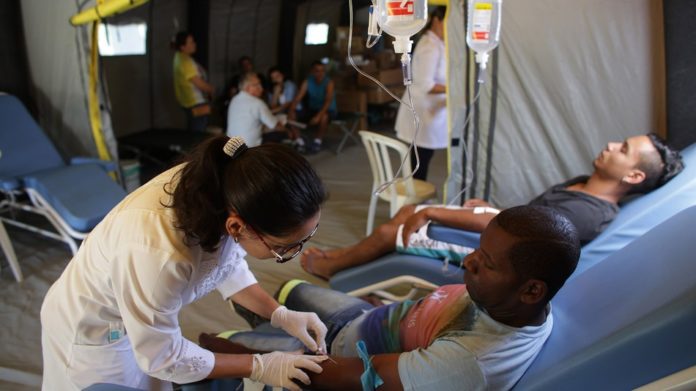CDC investigating 14 cases of Zika virus possibly spread through sex

The Centers for Disease Control and Prevention (CDC) announced Tuesday that it is investigating more than a dozen possible Zika virus infections that may have been spread through sex, including “several” involving pregnant women.
The 14 cases all involve men who visited areas with Zika outbreaks and may have infected their female sex partners, who had not traveled. The announcement indicates that although the test results on these individuals are not yet conclusive, the CDC is taking seriously the possibility that “sexual transmission may be a more likely means of transmission for Zika virus than previously considered,” the agency stated in a media advisory.
In two of the new suspected sexual transmission events, Zika virus infection has been confirmed in women whose only known risk factor was sexual contact with an ill male partner who had recently traveled to an area with local Zika virus transmission. In those two cases, there are still tests pending for the male partners.
As for the other suspected cases, the CDC said:
For four additional suspected sexual transmission events, preliminary laboratory evidence (IgM antibody test) is available for the women, but confirmatory tests are pending. For eight other suspected events, the investigation is ongoing. In all events for which information is available, travelers were men and reported symptom onset was within 2 weeks before the non-traveling female partner’s symptoms began.
Zika virus is mainly spread by mosquito bites. The virus and its rapid spread has caused concern, prompting CDC travel advisories to virtually all of Central America and much of South America, along with parts of the Caribbean, because of the disease’s suspected role in causing microcephaly, a rare birth defect in which a child is born with a smaller than normal head and incomplete brain development.
In addition, the virus is suspected of causing Guillain-Barré syndrome, a neurological disorder that can cause temporary paralysis in previously healthy adults.
Right now, scientists have far more questions than answers about Zika. Doctors do not know, for example, how many pregnant women with Zika will give birth to a child with congenital birth defects, or even how many people have been infected with Zika throughout the Americas. The mechanisms by which the virus causes birth defects and Guillain-Barré syndrome are also unclear, though more evidence is gathered every day.
Prior to the 14 suspected cases, there had been at least three reported cases of sexual transmission, including a recent case in Texas.
The CDC issued interim guidelines concerning sexual transmission of the virus on Feb. 5, and it re-emphasized these guidelines in a health advisory notice on Tuesday.
On its Facebook page, the CDC is taking no chances. “Are you a man returning from an area with known active transmission of Zika? Zika virus can be sexually transmitted by a man to his sex partners,” reads a recent post. “If your partner is pregnant, you should either not have sex or use condoms the right way every time.”
It also includes a graphic meant for pregnant women considering travel to Zika-affected areas.

Image: Facebook/CDC
